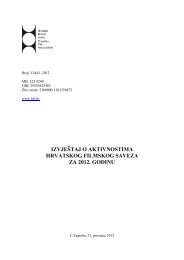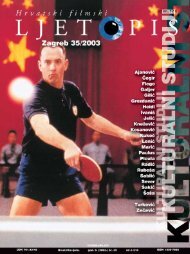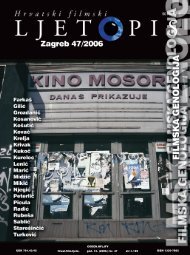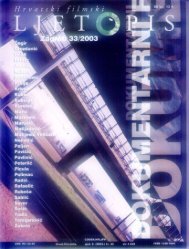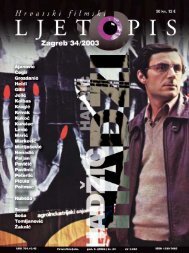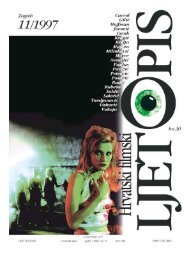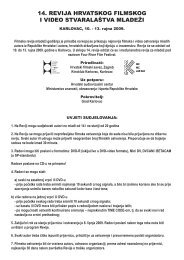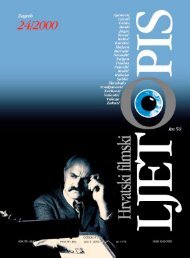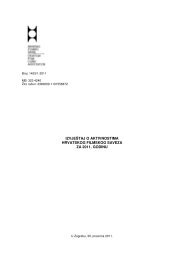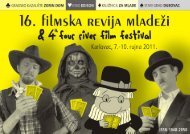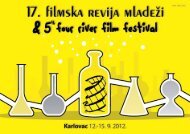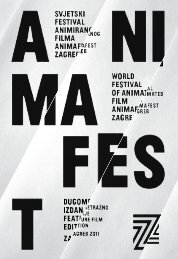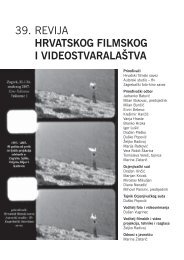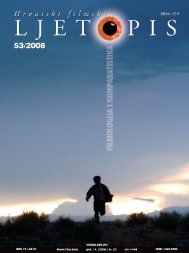Hrvatski filmski ljetopis, broj 56 (2008) - Hrvatski filmski savez
Hrvatski filmski ljetopis, broj 56 (2008) - Hrvatski filmski savez
Hrvatski filmski ljetopis, broj 56 (2008) - Hrvatski filmski savez
You also want an ePaper? Increase the reach of your titles
YUMPU automatically turns print PDFs into web optimized ePapers that Google loves.
hfl_<strong>56</strong>-q6.qxp <strong>2008</strong>-12-18 15:22 Page 171<br />
Hrvat. film. ljeto, Zagreb / god 14 (<strong>2008</strong>), br. <strong>56</strong>, str. 167 do 174 Sa`eci / Summaries<br />
Dejan D. Markovi}<br />
Ameri~ki road movie — opet na putu<br />
UDK: 791.237(73)<br />
Esej srpskog kriti~ara o kultnim ostvarenjima iz struje road movie, na ~iji je<br />
naziv i sadr`aj vjerojatno utjecao roman Jacka Kerouaca On the Road iz<br />
1957. godine. Na primjerima novijim filmova ceste (Thelma and Louise,<br />
Gregg Araki, My Own Private Idaho) komentira se nestanak idealizma i romantizma<br />
izvornih road filmova, tj. preostali ogor~eni antikonformizam,<br />
~esto i komercijalno prora~unat. U zasebnim poglavljima tekst zatim opisuje<br />
i komentira road filmove Easy Rider, Repo Man, filmove Wima Wendersa,<br />
Lost Highway, My Own Private Idaho i Crash Davida Cronenberga.<br />
IZ POVIJESTI HRVATSKOGA FILMA<br />
Leon Rizmaul<br />
Financije velikog vojvode F. W. Murnaua<br />
(1923) — najstariji sa~uvani film snimljen<br />
u Hrvatskoj<br />
UDK: 791.622(497.5)(091)<br />
[ezdesetih godina 20. stolje}a, u vrijeme dok je najve}i »murnauolog«, njema~ka<br />
autorica Lotte Eisner, pisala svoje knjige, Murnauov opus do`ivljavao<br />
je ponovno otkrivanje. Njegovi filmovi Nosferatu (1921), Posljednji ~ovjek<br />
(Der letzte Mann, 1924), Faust (1926) i Zora (Sunrise, 1927) podignuti<br />
su na pijedestal ne samo njema~ke me|uratne kinematografije. Eisner je<br />
svojim knjigama dodatno gradila mit o Murnauu — »sjetnom melankoli~aru«<br />
— ali njegovu komediju Financije velikog vojvode (1923) nije smatrala<br />
vrijednim ostvarenjem. Tvrdila je da je gluma lo{a, kadrovi preosvijetljeni i<br />
da se stje~e dojam da slavnog redatelja uop}e nije bilo briga kakav }e biti<br />
krajnji rezultat. Kasniji povjesni~ari filma redovito su preuzimali njezinu<br />
ocjenu kako je rije~ o neuspjelom poku{aju da se Murnau oku{a u komediji,<br />
bez novih istra`ivanja filma. Ovaj tekst prilog je istra`ivanju ovoga filma,<br />
u ovom trenutku najstarijega u cijelosti sa~uvanog igranog filma snimljenoga<br />
u Hrvatskoj. tekst u slijedu opisuje produkciju filma, lokacijska snimanja<br />
u Dalmaciji i Splitu, novinske izvje{taje te inozemnu recepciju filma, da bi<br />
na kraju ponudio revalorizaciju ove Murnauove podcijenjene »lake komedije«,<br />
posebno istaknuv{i da je lo{ dojam Lotte Eisner o vizualnoj strani filma<br />
bio o~ito uvjetovan lo{om snimkom, budu}i da je danas dostupna restaurirana<br />
kopija filma ~iji je snimatelj bio slavni Karl Freund, scenaristica<br />
Thea von Harbou (prema istoimenom romanu Franka Hellera), a producent<br />
Erich Pommer.<br />
Danijel Rafaeli}<br />
NDH na filmskom festivalu u Veneciji<br />
1942. godine<br />
UDK: 791(497.5)"1942"<br />
Sudjelovanje filmova Nezavisne Dr`ave Hrvatske na filmskom festivalu u<br />
Veneciji ~esto je u doma}oj filmskoj historiografiji razli~ito tuma~ena. Ovaj<br />
prilog, na temelju novinskih napisa, arhivske gra|e, sa~uvanih filmova i<br />
svjedo~anstava, rekonstruira sudjelovanje NDH na fa{isti~kom festival u<br />
Veneciji 1942. godine, te donosi to~ne podatke o navodnoj nagradi dokumentarnom<br />
filmu Branka Marjanovi}a Stra`a na Drini. NDH je pravo sudjelovanja<br />
na X. Mostra Internazionale D'Arte Cinematografica stekla prijemom<br />
u stalno ~lanstvo u Me|unarodnoj slikopisnoj komori u Berlinu u<br />
o`ujku 1942, ~ime je stekla prava u filmskoj industriji koja sui male i druge<br />
zemlje — sateliti Reicha. Venecijanskim festivalom u okviru Biennalea<br />
predsjedao je Giovanni Volpi di Misurata, a ravnatelj je bio Ottavio Croze.<br />
NDH su na filmskom festivalu u Veneciji predstavljali srednjometra`ni dokumentarni<br />
film Stra`a na Drini, Kultur-film Barok u Hrvatskoj, dokumentarni<br />
film Mladost Hrvatske / Radna slu`ba Usta{ke mlade`i (povu~en zbog<br />
Dejan D. Markovi}<br />
American road movie — On the road<br />
again<br />
The participation of the films of the Independent State of Croatia at the<br />
Venice Film Festival has been interpreted in different ways in the national<br />
film historiography. Based on newspaper articles, materials from the<br />
archive, preserved films and testimonies, this text reconstructs the participation<br />
of NDH at the fascist 1942 Venice Film Festival and brings accurate<br />
information regarding the alleged award to Branko Marjanovi}'s documentary<br />
Watch on the Drina (Stra`a na Drini). NDH acquired the right to participate<br />
at the X. Mostra Internazionale D'Arte Cinematografica by admittance<br />
to permanent membership of the International Film Chamber in<br />
Berlin in March 1942. This entitled it to film industry rights that other<br />
Reich satellites enjoyed. The Venice Film Festival in the Biennale framework<br />
was presided over by Giovanni Volpi di Misurata, with Ottavio Croze<br />
acting as its director.<br />
171<br />
H R V A T S K I F I L M S K I L J E T O P I S <strong>56</strong>/<strong>2008</strong>.<br />
UDK: 791.237(73)<br />
An essay by a Serbian critic about famous achievements in the road movie<br />
genre, the title and contents of which have most probably been influenced<br />
by Jack Kerouac's 1957 novel On the Road Again. The author uses the<br />
examples of more recent road movies (Thelma and Louise, Gregg Araki,<br />
My Own Private Idaho) to comment on the disappearance of idealism and<br />
romanticism, characteristic of original road movies, i.e. on the remaining<br />
desperate anti-conformism, many times commercially motivated. In separate<br />
chapters the text goes on to describe and comment on the road movies<br />
Easy Rider, Repo Man, films by Wim Wenders, Lost Highway, My Own<br />
Private Idaho and Crash by David Cronenberg.<br />
FROM THE HISTORY OF CROATIAN<br />
CINEMA<br />
Leon Rizmaul<br />
The Finances of the Grand Duke by F. W.<br />
Murnau (1923) — the oldest preserved<br />
film made in Croatia<br />
UDK: 791.622(497.5)(091)<br />
It was during the 1960s, the period over which the greatest »murnauologist«,<br />
German writer Lotte Eisner, wrote her books, that Murnau's work<br />
went through the process of rediscovery. His films Nosferatu (1921), Der<br />
letzte Mann (1924), Faust (1926) and Sunrise (1927) were set on the<br />
pedestal of German and other inter-war cinematography. In her books<br />
Eisner further contributed to the myth of Murnau — »the wistful melancholic«<br />
— but she never thought of his comedy The Finances of the Grand<br />
Duke (1923) as of a valuable piece of work. She claimed that acting was<br />
bad, frames had too much light and that one got the impression that the<br />
famous director did not even care about what the final result would be.<br />
Without further analyses of the film itself, later film historians regularly<br />
took on her view that the film was an unsuccessful attempt of Murnau's to<br />
shoot a comedy. This text is a contribution to the study of what is today the<br />
oldest entirely preserved feature film made in Croatia. The text chronologically<br />
describes film production, location shootings in Split and<br />
Dalmatia, news reports and how the film was received abroad, followed by<br />
a re-evaluation of this underestimated »light comedy« of Murnau's. It is<br />
pointed out that the reason for Lotte Eisner's bad impression on the visual<br />
character of the film was obviously bad tape, since there exists today a<br />
restored copy of this film, whose cinematographer was the famous Karl<br />
Freund, scriptwriter Thea von Harbou (based on a novel by Frank Heller<br />
of the same name) and producer Erich Pommer.<br />
Danijel Rafaeli}<br />
Daniel Rafaeli}: Independent State of<br />
Croatia (NDH) at the 1942 Venice Film<br />
Festival<br />
UDK: 791(497.5)"1942"



